Report back on the third IRTC Steering Committee meeting
02 May 2017 | Sipho Pityana
The Chair of the IRTC Steering Committee has submitted a letter on the committee's third sitting on 18 April 2017, and progress towards developing provisional terms of reference for the IRTC.
Dear members of the UCT community
The third sitting of the Institutional Reconciliation and Transformation Commission (IRTC) Steering Committee took place on 18 April 2017. The committee reached a milestone by being fully representative after two members were elected to represent non-unionised staff. Ms Portia Nyalela and Ms Linda Maqasha were duly elected at two meetings, which were held to conduct a direct ballot with Payclass 2 workers – a sector of the university community that is currently not represented on the Steering Committee by any staff body on campus.
On the substantive issue regarding the formulation of the provisional terms of reference (TOR) for the IRTC, a highly contested debate ensued for some time. This debate was essential in order for diverse views to be expressed with the aim of finding collective ways of reaching a resolution through consensus. While it is acknowledged that the route of consensus-building was more time consuming, it was important for the validity and legitimacy of the process, favouring inclusivity over meeting abstract timelines. After a lengthy and insightful debate, which oftentimes highlighted the high levels of distrust and the deep divisions in our community, the Steering Committee resolved that it was essential to embark on a trust-building process among the diverse constituencies.
Of note was the fact that some student formations had not been involved in the drafting of the revised TOR. This speaks to how timelines may not have taken into account the reality of student life, which comprises the writing of tests and Students' Representative Council (SRC) elections, among other things. The Steering Committee in this matter also decided to defer its timelines in order to achieve inclusivity and greater participation.
In order to deal with the above, the Steering Committee resolved to hold a professionally facilitated, extended sitting of its TOR Drafting Committee over a weekend around mid-May in order to fulfil the mandate of revising the IRTC TOR and the criteria for nominating commissioners.
It also anticipated the need, at the 18 April sitting, to resolve the practical processes to be instituted in order to arrive at a set of five recommended names which will have to be finally be approved by Council. This meeting will take place on 20 May 2017.
Mr Sipho M Pityana
Chair of the IRTC steering committee (and Chair of UCT Council)
 This work is licensed under a Creative Commons Attribution-NoDerivatives 4.0 International License.
This work is licensed under a Creative Commons Attribution-NoDerivatives 4.0 International License.
Please view the republishing articles page for more information.
Institutional Reconciliation and Transformation Commission (IRTC)
The Institutional Reconciliation and Transformation Commission (IRTC) Steering Committee was established as a result of a period of unprecedented tension at the University of Cape Town (UCT) at the end of 2016. The creation of the multi-stakeholder steering committee that will oversee the proposed IRTC was one of the resolutions made in the 6 November 2016 agreement, which effectively brought the waves of continuing protest at the university to a halt.
The agreement, which was signed between the UCT executive and protesting student groups, paved the way for the establishment of the IRTC, whose aims are to
- consider all Shackville-related protests of 2016, including disciplinary procedures and interdicts
- invite submissions from all constituencies on clemencies that were granted and decide whether clemency should be turned into amnesty
- make recommendations on how the university should deal with pending cases and other such matters in the future
- make recommendations on institutional culture, transformation, decolonisation, discrimination, identity, disability and any other matters that the university community has raised over the past 18 months, or may wish to raise in the future.
The IRTC’s objective is to map an inclusive and fair course for the university as it tackles the legacy of the so-called Shackville protests and to focus on the issues that have caused division on our university campus.
Read IRTC documents:
- Read the 6 November agreement
- Read the declaration by students seeking clemency
- Read the FAQ about the agreement
- Read the criteria and process for nominating commissioners - List of Steering Committee Members
- Names of the IRTC Steering Committee members
- Email addresses of the IRTC Steering Committee members
- See the announcement of the IRTC Commissioners
- IRTC Final Report
A summary and analysis of the Terms of Reference are given in Chapter 2, starting on page 7
Feedback and responses to the IRTC report:
IRTC Final Report

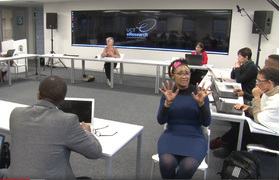

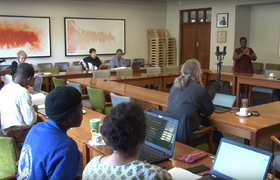

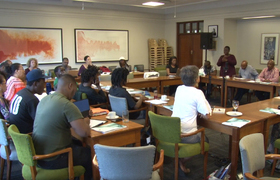
Statements by the IRTC
Latest news
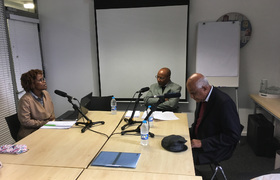
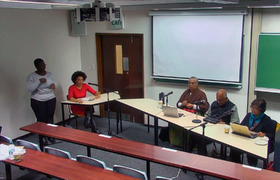


Reports from the Steering Committee Chair
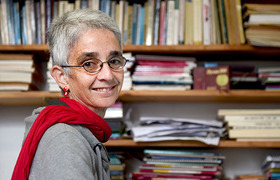

2018 IRTC Steering Committee meetings
2017 IRTC Steering Committee meetings





















